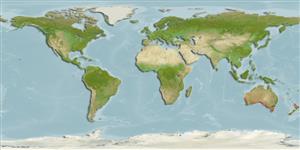Teleostei (teleosts) >
Syngnathiformes (Pipefishes and seahorses) >
Syngnathidae (Pipefishes and seahorses) > Nerophinae
Etymology: Heraldia: From the Old german, xariwald = army rule (Ref. 45335).
Eponymy: Dr Earl Stannard Herald (1914–1973) was an American ichthyologist. [...] (Ref. 128868), visit book page.
Environment: milieu / climate zone / depth range / distribution range
Ecology
Marine; reef-associated; depth range 2 - 15 m (Ref. 5316). Temperate
Eastern Indian Ocean: southern Australia, from Geographe Bay, Western Australia to Terrigal, New South Wales.
Length at first maturity / Size / Weight / Age
Maturity: Lm ?, range 6 - ? cm
Max length : 9.2 cm SL male/unsexed; (Ref. 5316)
Adults occur in rocky reefs. Appear to feed nocturnally, and usually found swimming upside down in caves or under ledges during the day. Ovoviviparous (Ref. 205). Males carry the eggs in a brood pouch which is found under the tail (Ref. 205). Males may be brooding at 6.3 cm SL.
Life cycle and mating behavior
Maturity | Reproduction | Spawning | Eggs | Fecundity | Larvae
Male carries the eggs in a brood pouch (Ref. 205).
Dawson, C.E., 1985. Indo-Pacific pipefishes (Red Sea to the Americas). The Gulf Coast Research Laboratory Ocean Springs, Mississippi, USA. (Ref. 5316)
IUCN Red List Status (Ref. 130435: Version 2024-1)
Threat to humans
Harmless
Human uses
Tools
Special reports
Download XML
Internet sources
Estimates based on models
Preferred temperature (Ref.
123201): 14.9 - 22.8, mean 17.7 °C (based on 323 cells).
Phylogenetic diversity index (Ref.
82804): PD
50 = 1.0000 [Uniqueness, from 0.5 = low to 2.0 = high].
Bayesian length-weight: a=0.00093 (0.00036 - 0.00242), b=3.05 (2.83 - 3.27), in cm total length, based on LWR estimates for this (Sub)family-body shape (Ref.
93245).
Trophic level (Ref.
69278): 3.6 ±0.5 se; based on size and trophs of closest relatives
Resilience (Ref.
120179): High, minimum population doubling time less than 15 months (Preliminary K or Fecundity.).
Fishing Vulnerability (Ref.
59153): Low vulnerability (10 of 100).
